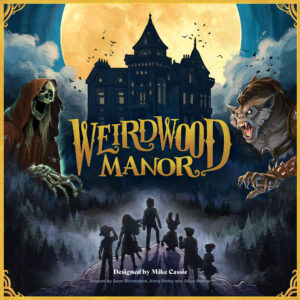 Welcome to Weirdwood Manor, a house situated at the nexus of our real world and the magical Fae realm. Lady Weirdwood rules the manor and has tasked you to be one of her loyal Wardens. Your job is to help keep the balance in check… however, the monsters from the Fae realm have broken through the barrier and are rampaging through the manor. It’s up to you and your fellow Wardens to protect the manor and defeat the Fae monster.
Welcome to Weirdwood Manor, a house situated at the nexus of our real world and the magical Fae realm. Lady Weirdwood rules the manor and has tasked you to be one of her loyal Wardens. Your job is to help keep the balance in check… however, the monsters from the Fae realm have broken through the barrier and are rampaging through the manor. It’s up to you and your fellow Wardens to protect the manor and defeat the Fae monster.
Published by Greyridge Games, Weirdwood Manor is a cooperative game for 2-5 players that takes about 120 minutes to play. Weirdwood Manor plays best with 2 Players.
Gameplay Overview:
Weirdwood Manor is a game with a simple turn structure but with a lot of exceptions. As the rulebook clocks in at a filled-to-the-brim 24 pages, I’m going to only give you a high-level overview of the gameplay here. If you want the full ins and outs, you can download a PDF of the rulebook here.
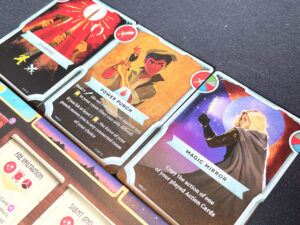
On a player’s turn, they first play one of their action cards to their player board. It can be played either face up for its special ability or face down for one of the basic actions (move, fight, gain a resource). Then, depending on which slot it was played into, the time of day tracker is turned to one of the three matching positions (morning, afternoon, evening, night). If the time of day tracker ever passes from night to morning you also advance the day tracker one day.
Then the player takes their action. This may be moving around the manor (to any connected room) and performing the room action, or possibly fighting the monster. Combat is handled via dice rolls, with the player and monster rolling dice and inflicting damage on each other.
At the end of a player’s turn, the monster takes an action. It first will rotate the time tracker a number of spaces (usually from 2-4), and then take an action. This may be buffing itself, moving around the manor, fighting players, or spawning scarab tokens.
Then the next player takes their turn. Throughout the game, players will be gaining experience on up to 3 different tracks, recruiting companions, casting spells, and gaining Warden cards. The end goal is to defeat the monster before the end of the 12th day, or it completes its objective.
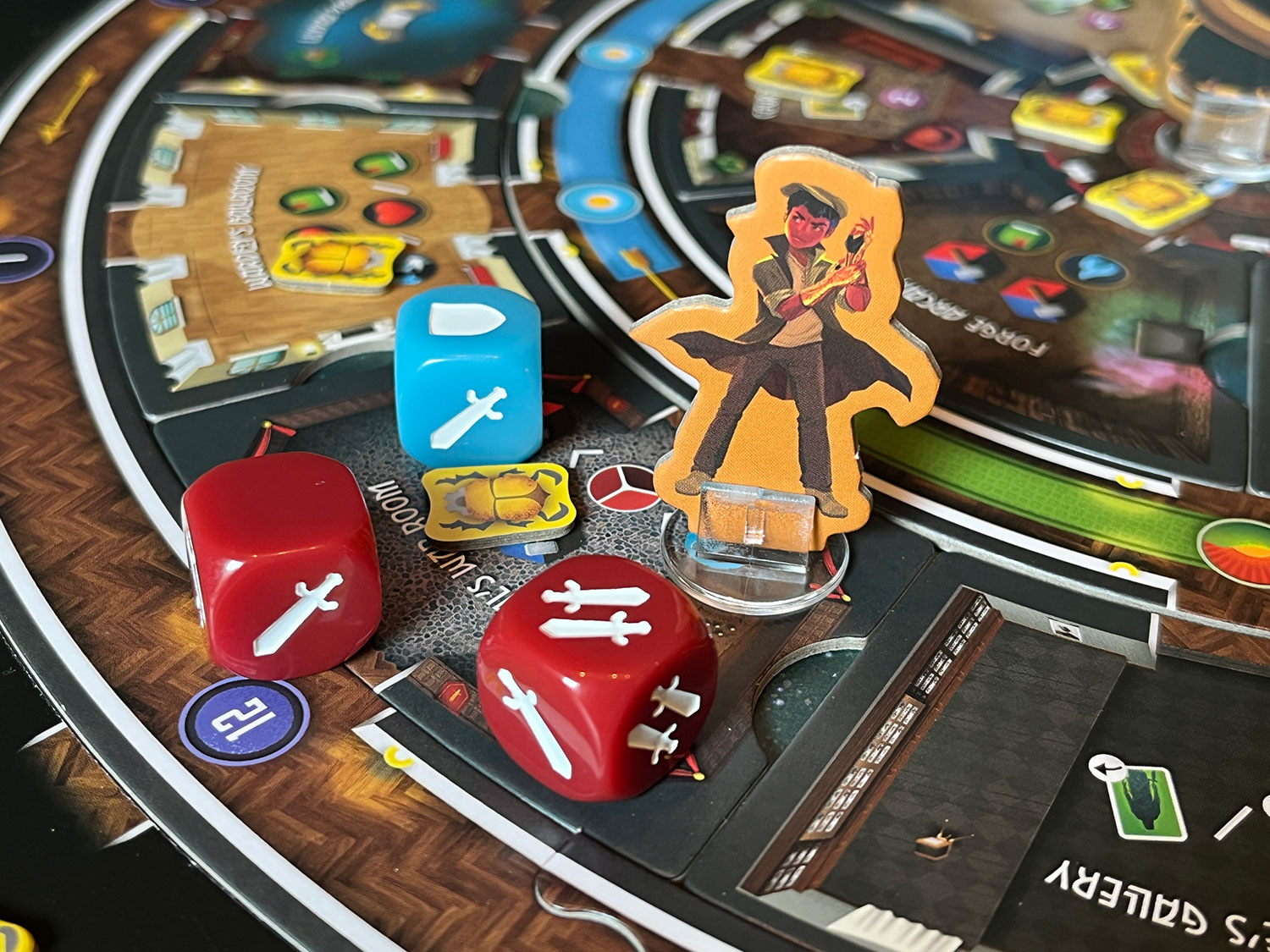
Game Experience:
Were I to go into full details, the overview section above could easily be 2-3x as long. Weirdwood Manor is a complex game with a lot of moving parts (pun intended). For new players, I’d highly suggest a partial learning game of at least a few rounds. I played about half a game before I brought it to game night and I’m glad I did. I was nose-deep in the rulebook almost every turn during the learning game. While the turn structure is simple, there are a lot of little bits here and there to make things more complex: where can I move to, how much do I rotate the ring, what effect do scarabs have, the aftermath of battles, how do you use companions, what is this rooms action, about 100 different icons (not really, but its a lot)… The end result is that your first game will be long and slow as you wrap your head around how to play the game.
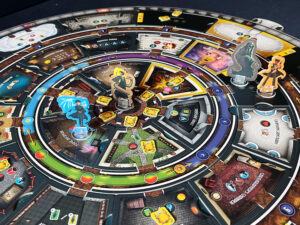
That being said, once you do get a feel for the game, there are a lot of interesting things happening. On your turn, you are presented with a wealth of choices. There are 4 different resources to manage which are used for vital actions like casting spells, upgrading your combat dice, recruiting companions, and sometimes using more powerful action cards. So you want to gain as many resources as possible to ensure that your character is properly leveled up.
And that’s actually one of my favorite parts of Weirdwood Manor. The three experience tracks and how generously the game doles out XP. There are rooms that grant them for visiting them, there are character powers that can provide them, and every hit on a monster or scarab grants an XP. So if you hit the Fae for 6 damage, you are moving up six spaces on the XP tracks, with many spaces granting bonuses to your character. This gives you a solid feeling of power as your Warden becomes stronger and stronger.
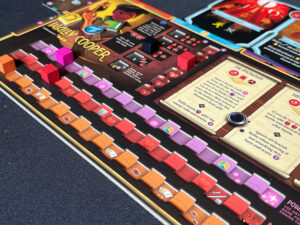
Yet where the game can start to struggle is when you need to interact with the game board. There are 30+ rooms in the manor and getting where you want to go is not always easy. The board consists of 3 rings of rooms, each of which has a door that may or may not be accessible when you take your turn. As the time rings move, they lock and unlock access to rooms. And with 2 independent rings, it can be tricky trying to figure out if you actually have a way to get from room A to room B. So usually, at the start of your turn, you are trying to assess where you want to go and if that room is even accessible, which can be frustrating. You may really want to upgrade a die, but if access to the forging rooms is all blocked (by doors or scarabs), you are out of luck.
However, the worst is when the day changes and that ring rotates as this causes every other outer room to be inaccessible. If you happen to be in one of those rooms at the start of your turn, you are locked out from doing anything other than gaining one resource. In a game where every action is precious, this is not a great feeling. While you can try and plan ahead and make sure you aren’t locked out, this can be a lot more difficult as the player count increases. In fact, if you play in a 5 player game (note: do not ever play at this player count), you actually won’t get a turn on the first day altogether, so you’ll need to use a portal card to even get out of your starting room.
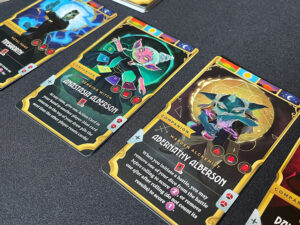
That is also the reason why I think 2 players is the sweet spot for this game. Thanks to the ever-changing board state, this game is more reactionary than strategic. You can’t really plan ahead because you have no idea how the doors will change as it gets to your turn. As each player moves the time rings, and the Fae as well, it’s impossible to plan more than one turn ahead. At the higher player counts, you can spend 20 minutes waiting to take your turn, only to be stuck in a room and do nothing on your turn.
The other big issue I had with the game was it felt really hard to get to the monster and attack it. Each player has only a couple of cards that let you move and attack, which means you’ll be spending turns moving, or you’ll need to be already in a space with a monster to be able to attack it. And with the board so in flux, that’s not always possible. For a game that’s centered around taking down the big bad monster, we felt like we were doing a ton of work just trying to get to the battle. And as the monster grows in strength with each passing day, if you don’t hit him early enough, it might be too late by the time you actually get to him.
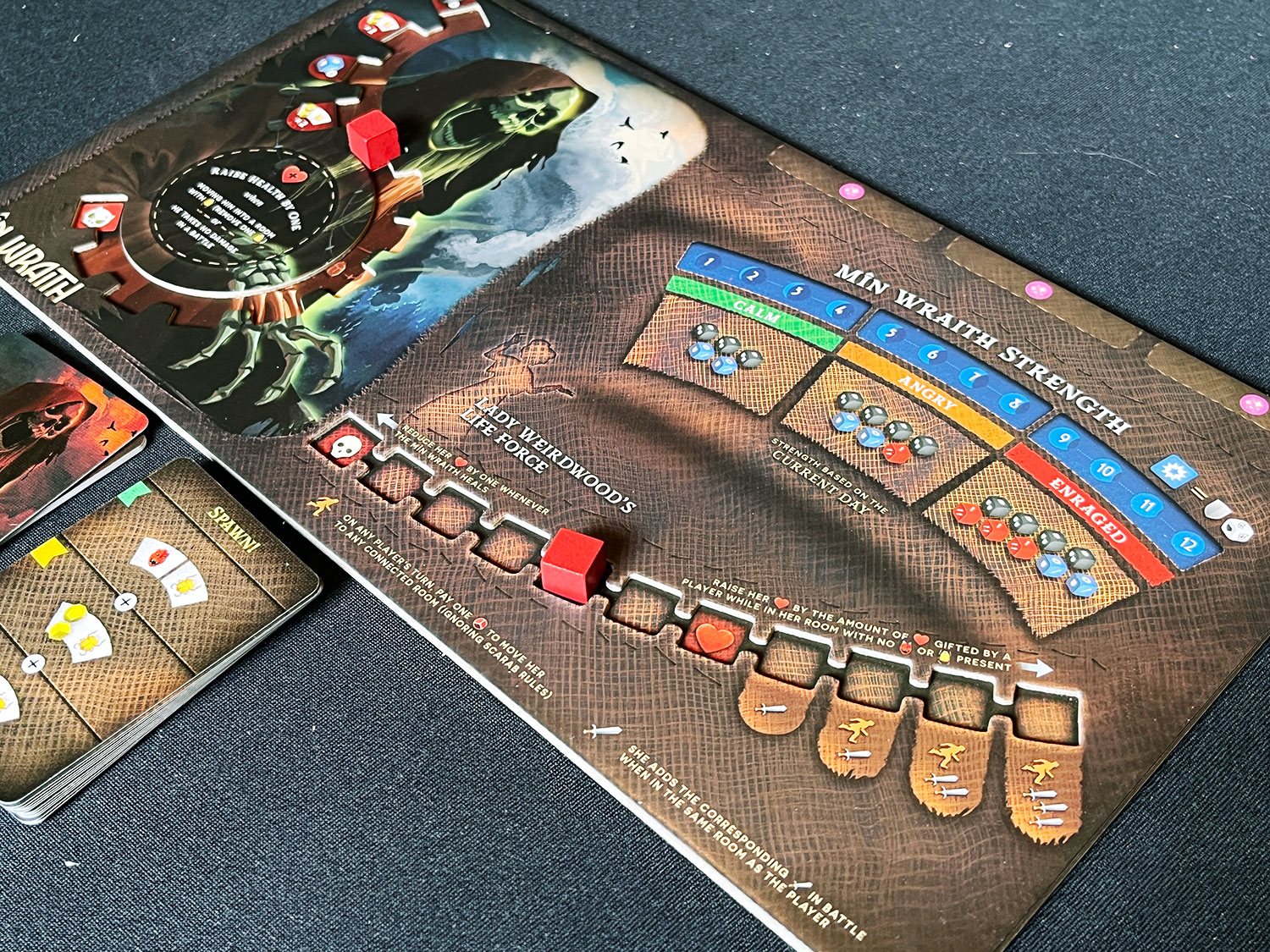
Final Thoughts:
Weirdwood Manor is a game with a lot of cool concepts, but also one that felt like it could have used a little bit more time in development. While we have won the game, we’ve also had a few brutal losses. The game is long, probably a bit too long for what it is. However, it also has some neat ideas. There are lots of ways for your character to feel powerful and when things click, the game is a lot of fun. Yet interspersed among these moments are plenty of frustrations as you can’t get to where you need to be or boring turns where you don’t do very much. As it stands now, Weirdwood Manor is a good game, just not one ready for greatness.
Final Score: 3 Stars – Some great and innovative mechanics held back by too often moments of frustration.
 Hits:
Hits:
• Lots of interesting ideas and mechanics
• Great sense of character progression
• Unique characters and monsters
Misses:
• Moving around the manor can be an exercise in frustration
• Steep learning curve with a lot of moving parts
• Longer playtime than you’d expect
Source: Board Game Quest



